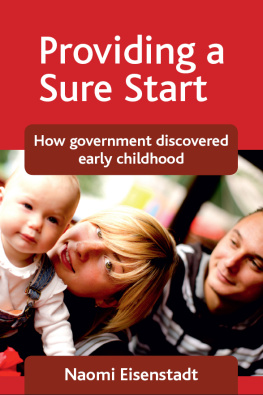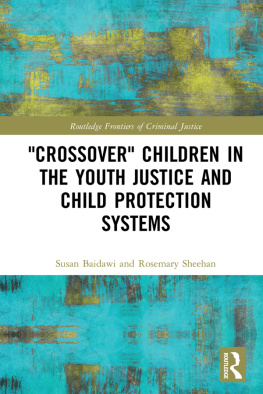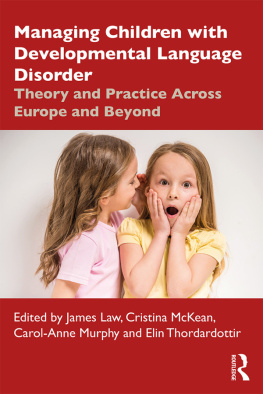First published in Great Britain in 2011 by
The Policy Press
University of Bristol
Fourth Floor
Beacon House
Queens Road
Bristol BS8 1QU
UK
Tel +44 (0)117 331 4054
Fax +44 (0)117 331 4093
e-mail tpp-info@bristol.ac.uk
www.policypress.co.uk
North American office:
The Policy Press
c/o The University of Chicago Press
1427 East 60th Street
Chicago, IL 60637, USA
t: +1 773 702 7700
f: +1 773-702-9756
e:sales@press.uchicago.edu
www.press.uchicago.edu
The Policy Press 2011
British Library Cataloguing in Publication Data
A catalogue record for this book is available from the British Library.
Library of Congress Cataloging-in-Publication Data
A catalog record for this book has been requested.
ISBN 978 1 84742 729 8 paperback
ISBN 978 1 84742 730 4 hardcover
The right of Naomi Eisenstadt to be identified as author of this work has been asserted by her in accordance with the 1988 Copyright, Designs and Patents Act.
All rights reserved: no part of this publication may be reproduced, stored in a retrieval system, or transmitted in any form or by any means, electronic, mechanical, photocopying, recording, or otherwise without the prior permission of The Policy Press.
The statements and opinions contained within this publication are solely those of the author and not of The University of Bristol or The Policy Press. The University of Bristol and The Policy Press disclaim responsibility for any injury to persons or property resulting from any material published in this publication.
The Policy Press works to counter discrimination on grounds of gender, race, disability, age and sexuality.
Cover design by Qube Design Associates, Bristol
Front cover: image kindly supplied by www.istock.com
Printed and bound in Great Britain by Hobbs, Southampton
The Policy Press uses environmentally responsible print partners
Readers Guide
This book has been optimised for PDA.
Tables may have been presented to accommodate this devices limitations or/and use scroll function for a complete review of the tables as and where needed.
Image presentation is limited by this devices limitations.
Foreword
My involvement with Sure Start has taken me from managing a Trailblazer programme in the Ore Valley in East Sussex, to Sure Start Advisor for two London boroughs, and now to my current post as Childrens Centre Locality Manager, covering five centres across 750 square miles of rural North Northumberland.
Before 1997, the providers of early years services were kept going on low levels of funding, short-term allocations and a system that concentrated on the school system, paying little regard to all that went before children were five years old. The practitioners argued that they needed more money for parenting services, a greater emphasis on the needs of the very young and more research into what works and what makes a real difference to outcomes, but went largely unheard.
Early years services had always been underfunded and to a large extent disregarded, with very little emphasis placed on the care of very young children, whether in the family home or in the wide range of care settings that existed in the mid-1990s. In 1997 came the plan for the piloting of Early Excellence centres, provision for young children that combined extended hours of childcare with the quality of early education. Then, in 1998, a review of how government departments could work in a more collaborative way to improve services for young children was announced. The idea of cross-cutting reviews and interdepartmental collaboration seemed a very simple process, but it was one fraught with problems and historic issues of silo working.
There was an early decision by ministers to focus on children under four, an area classed by Norman Glass, the Treasury official in charge of the review, as a policy-free zone . There was also a realisation that improved services for the very young might even result in long-term savings for the taxpayer, a very attractive thought in the light of the huge amounts of money spent on ameliorating the effects of child poverty.
During 1999, I was running a scheme called Play link, funded by East Sussex County Council. The idea was simple. We visited every child aged 18 months in a defined geographical area, an area with high levels of child poverty, poor antenatal health and fragmented and patchy childrens services. We offered a one-hour home visit per week for one year; we took in play activities, working alongside the primary carer to provide play-based activity and supporting the parent in their vital role as their childs main educator. The service worked with parental strengths, rather than concentrating on any deficits in their caring role, and sought to help them identify their own answers to any concerns around their childs behaviour.
In addition, we provided family drop-ins, adult learning opportunities, outings and trips, plus very simple practical help, with access to debt advice, housing surgeries, community health support and so on. The scheme worked, with some measurable outcomes. It was locally coordinated and locally driven, but, at the time, we spoke of working more closely together, rather than articulating that what we really wanted was more effective service integration. We simply lacked the authority to get the other key services like health and education to work collaboratively.
Most of the local agencies still operated separately separate budgets, separate training and separate outcomes and very little thought was given to how much time, money and effort could be saved by more holistic work with children and families led by local intelligence and based on what would really make a difference, rather than what we thought families needed.
And then Sure Start arrived. Following a requested visit from a senior civil servant, we were awarded Trailblazer status, one of the first of 60 Sure Start Local Programmes to be set up. The first element of the process was the delivery plan, we had to cost what was available locally to ensure statutory services did not use Sure Start funding to replace core funding. This proved to be an almost impossible task, as very few agencies were able to define how much they spent per locality lesson one in how difficult it is to define and fund a local service based on actual knowledge rather than assumptions. Somehow we found a way forward, and the plan was duly written and agreed.
The plans for all Trailblazers were slow to come to fruition and the challenge was to provide ministers with the action and change they wanted, whilst at the same time staying true to the idea of being locally led and locally driven with families setting the agenda, and being at the forefront in terms of governance.
Leadership for the centre was crucial. Naomis clear vision and her grasp of the complexity of the issues faced by Sure Start Local Programmes enabled us all to believe that what was being asked of us was possible. As the programme grew, her advocacy with government and her fearless approach to all difficulties that came our way filled us with admiration, and a growing belief in what we could all achieve.
The Sure Start model changed as government ministers and government thinking changed. Some original Public Service Agreement targets were deleted and new ones were added, especially those around support for parents and carers to enter or re-enter the labour market supported by affordable and accessible childcare.








